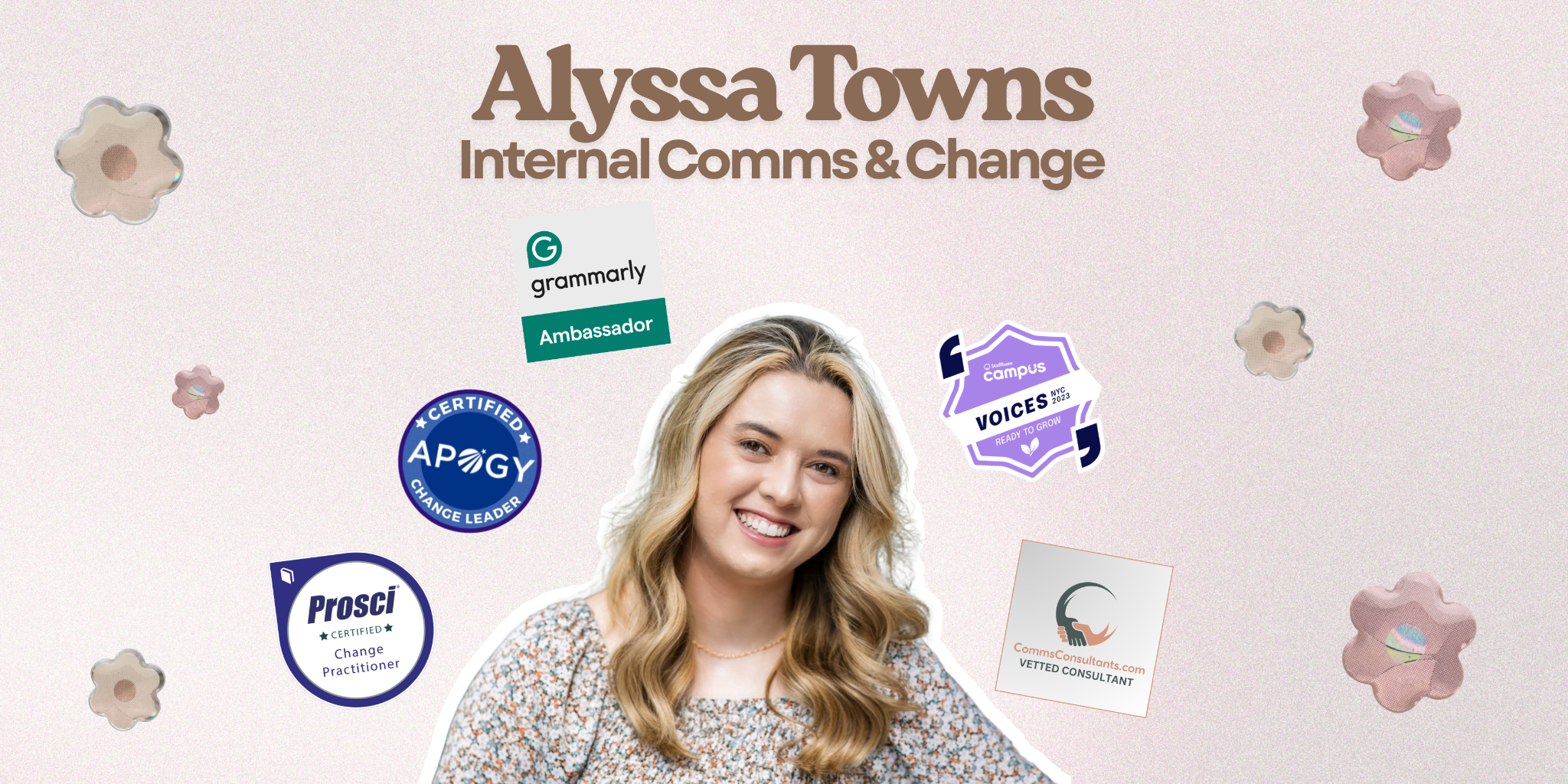
What is a Fractional Internal Communicator? (+ Why You Need One)
Workvivo by Zoom hosted a live debate between Hebba Youssef, Chief People Officer at Workweek and founder of I Hate it Here, and Chuck Gose, founder of ICology: Who owns Employee Experience: Internal Comms or HR?
While discussing employee experience ownership, Hebba explained that she believes it depends on the organization itself; however, she tends to lean toward HR for one important reason:
“At smaller companies, the chances of you having an internal comms professional is quite rare.” -Hebba Youssef
While this conversation was specific to the overall employee experience, Hebba’s point rings true. This is typically the norm for startups and smaller companies. Internal comms often falls in the laps of HR teams, marketing leaders, executive and administrative assistants, and other generalist-type titles responsible for supporting the organization.
Proving the need and budget for a full-time internal communications hire may prove unsuccessful. But your organization doesn’t have to treat internal communications as a side gig to employees’ full-time roles.
That’s where a fractional internal communicator comes in: a part-time, embedded strategist to work with your people-focused employees to help your team communication with focus, alignment, and confidence, without the full-time overhead.
What exactly is a fractional internal communicator?
A fractional internal communicator is an experienced communications professional who offers strategic support, supports the flow of information and two-way communications, and helps teams build the structures to support growing internal communications efforts, all without the overhead of a full-time hire. Fractional communicators may work on contract full-time for a set period (e.g., 6 months, 12 months, etc.), or they may work part-time with multiple clients on an ongoing basis (e.g., 10 hours per week for 1 year).
Notably, a fractional internal communicator possesses the knowledge to establish robust internal communication structures and practices that support organizations as they expand and grow. They often work closely with leadership, HR, marketing, and administration, depending on the specific organization’s setup.
Why startups and small organizations are turning to fractional support
In growing organizations, the complexity of internal communications often outpaces the rate at which the organizational chart grows. There’s a pivotal point at which “quick chats” and “everyone heard the update because they were in the room” are no longer the norm. Without the right systems, teams lack structured updates, documentation, and clear roles that drive their internal communications forward.
Not to mention that smaller teams move at a rapid pace, communicating about various topics, including:
- Leadership updates
- All-hands, town hall Q&As, and Ask Me Anything (AMA) sessions
- Change or restructuring announcements
- Messaging product changes
- Company OKRs or quarterly goal alignment
- Departmental priorities and roadmap explanations
- Operational changes (e.g., workflow adjustments, new software tools, updated processes)
- Financial performance transparency
- Policy changes and benefits
- Team and morale-building activities (e.g., culture, team retreats, etc.)
- Employee recognition and acknowledgement (e.g., wins of the week, milestone celebrations)
- Social impact or volunteering opportunities
- Learning and development opportunities
- Emergency updates and situational crisis communications
If reading this list drained you, that’s the point! As communication scales with the team's size, an unstructured approach to your organization’s messaging feels reactive rather than strategic, and can leave employees feeling overwhelmed.
That’s where fractional internal communications support is valuable. We can help businesses design and implement communication systems that work for them, creating clarity, predictable cadence and rhythms, and reliable channels and frameworks for your team.
What does a fractional internal communicator actually do?
What does a fractional communicator do? What can they actually help your business with?
In short, a fractional internal communicator helps your organization create clarity, connecting your strategy, people, and messages. In practice, that often looks like working with someone who can serve as both a strategist and storyteller, building systems that help people communicate more effectively and write meaningful communications that impact behaviors and support understanding (because that’s the goal of internal communications, right?).
Here are some examples of what fractional internal communicators can do for your business:
The “thinking” work, aka strategic activities
- Develop internal communications strategies that align with business goals and company values
- Advise leaders and founders on how to communicate effectively during uncertainty, transitions, and rapid growth
- Build frameworks and rhythms for consistent leadership communication
- Audit existing channels, messaging, and ease of communication access to uncover gaps, redundancies, and inconsistencies
- Create communication playbooks for scaling teams — adding layers of accountability and ownership around the who, what, when, and how of communications
- Partner with HR and people teams on culture storytelling, values messaging (or rebranding), and onboarding communications to elevate the employee experience
The goal is to help leadership define how information should flow, including who communicates what, and how every message ties back to the organization’s broader narratives.
The “doing” work, aka tactical support and execution
- Ghostwrite and edit key messages, including leadership updates, product announcements, change communications, and more
- Plan and execute internal campaigns, such as product launches, policy rollouts, and cultural initiatives
- Manage internal communication channels (e.g., Slack announcements, intranet posts, and company newsletters)
- Create tone-of-voice guides and templates to make it easier for teams to communicate consistently
- Produce communication toolkits, including FAQs and talking points for managers, for effective cascading communication
- Develop employee surveys and feedback loops for practical two-way communication efforts
- Document communication workflows so new hires can ramp up quickly
I find teams most often feel they need additional hands on deck for tactical support and execution, given that it’s the most time-consuming work. One benefit of working with me is that, even if you only need tactical support, I bring internal communications and change management knowledge, as well as in-house experience, to the table, providing higher-quality deliverables than those of a contractor without the same level of expertise.
Whether you need strategic or tactical support, or a combination of the two, I can help.
The benefits of fractional communications support
The benefits of hiring fractional internal communicators include:
- Affordability: Fractional communicators can deliver expert-level insight at a fraction of the cost of a full-time headcount (and without the fees of an agency). You get strategic value and hands-on execution without the high price tags, overhead of benefits, management, or arduous onboarding cycles.
- Scalability and flexibility: The amount of internal communications support you receive scales up or down based on your organization’s specific needs. Do you have a few ad hoc needs that you'd like taken care of? Great! Want a dedicated number of hours of weekly support? Awesome. Fractional support can scale with your organization, without requiring an overextended budget.
- Immediate impact: Highly-skilled fractional communicators bring experience, an extensive network of resources for additional support, and unrivaled problem-solving abilities. This enables them to diagnose issues quickly, recommend improvements, and build momentum toward effective communication structures.
- Continuity and reliability: The nature of internal communications is niche and unique. While it requires strong writing, storytelling, organizational, and critical thinking skills, there’s an equally important layer of understanding an organization’s inner workings that we have to account for. This is where having an embedded partner supersedes working with multiple freelancers or agencies that support your work, but lack the internal lens to provide continuity.
How fractional internal communications engagements work
Fractional communication services vary depending on the specific communicator, but I’ll consistently meet your organization where you need it. Every engagement can (and often does) look different, but the goal is always to create the most impact in the time allotted.
Retained-based partnerships typically work well. Clients can engage a fractional internal communicator for a set amount of time or several deliverables each week. Think five, 10, or even 20 hours of weekly support. Or you could hire a fractional communicator to produce your internal newsletter, three leadership emails, and one additional template on a bi-weekly basis.
Additionally, some companies bring in fractional support for specific initiatives in a time-bound period, including:
- Designing an internal communications “playbook” with a channel guide and onboarding materials for new employees
- Introducing or refreshing company values and storytelling around culture
- Launching or refreshing an internal newsletter
- Launching an intranet hub or other employee experience app
- Creating internal communications templates for various persona groups
- Planning communication initiatives for change and transformation projects, including restructuring, policy changes, or workplace expectations
- Building and implementing communication feedback loops, including pulse surveys, engagement check-ins, and leadership listening sessions
- Helping HR craft authentic communications for wellness, belonging, or learning initiatives
- Simplifying overlapping or redundant messages across tools (e.g., Slack, email, Asana, etc.)
- Training teams or managers on best practices for internal comms
- Ghostwriting or polishing CEO/founder communications (e.g., updates, reflections, announcements)
Finally, fractional communicators often partner closely with HR, people teams, operations, and executive assistants to ensure communications flow smoothly.
What to look for in a fractional internal communicator
Choosing the right fractional partner you can trust and embed into your business makes all the difference.
First and foremost, you need someone with the proper skill set to support your specific communications needs, whether that’s auditing, strategy development, ongoing tactical execution, or a combination. Some additional things you should look for include:
- A strategic foundation in internal communications (bonus points for change management training): Look for a fractional communicator with proven experience, extensive training, and perhaps credentials to support their background. Change management training is a bonus, especially if you plan to engage a fractional communicator for change-related communications.
- Coaching and advisory abilities: The best communicators know how to coach with poise, and they aren’t afraid to speak up and offer counterperspectives to help founders and leaders.
- Strong writing and storytelling abilities: Clear, authentic, human communication is the core of the work. Even with the use of AI, internal communications remain primarily person-to-person, and strong written skills, as well as oversight of technology-generated drafts, are still essential.
- Empathy and emotional intelligence: The best communicators listen carefully, pick up on the unstated, and identify potential areas of friction and resistance to help leaders get ahead.
- An understanding of agile and small team cultures: They know how to move fast without creating chaos, balancing structure with flexibility.
A little bit about me
Hi, I’m Alyssa Towns! I’ve supported internal communications and employee engagement for nearly a decade, both in unofficial (as an executive assistant) and official (as a senior communications manager) capacities. I’ve ghostwritten for CEOs and executives, executed company-wide employee recognition events, led communications for significant company changes, including mergers and acquisitions (M&As) and CEO transitions, and developed templates, communication training, and in-house communications hub tools.
I volunteered on the Association of Change Management Professionals (ACMP) Colorado Chapter Communications Committee from 2021 to 2022, and served as the Communications Director from 2023 to 2025. And a few more tidbits:
- I’m a Prosci® Certified Change Practitioner and Apogy Certified Change Leader
- I’m a vetted consultant with CommsConsultants.com (and if I’m not the right fit for your organization, I can help you find someone who is)
- I facilitated two roundtable discussions on creating engaging internal presentations and encouraging risk-taking at Workshop’s inaugural BrightSide conference in 2024
- I’ve written extensively about internal communications as an expert contributor:
- Surviving (and Thriving) in Internal Comms When You’re Also on the Marketing Team (Speakap)
- Your Newsletter Storytelling Playbook (Staffbase)
- How Grammarly Helped Me Become a More Effective Internal Comms Pro
- Internal communicators are the next wave of change leaders (Ragan)
- Creating a Change Management Communications Plan: A Guide for IC and HR Pros (Workshop)

Thinking about fractional internal comms support?
Whether you need a few months of hands-on support or an ongoing partner to guide your internal communications strategy, I’d love to help.
Post a comment